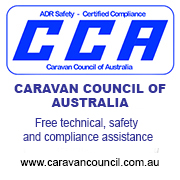|
|
|
Call for
'double-check' inspection checklists
CCA expresses disappointment over recurring design and quality problems
 Have your say
Have your say
THE Caravan Council of Australia has
expressed regret that design and quality problems still exist with RVs.
Founder and qualified automotive engineer Colin
Young (pictured) said it was "most
disappointing" that the same type of complaints were being detected.
"It can only be hoped that the new requirements ‒
as legislated in the Road Vehicle Standards Act ‒
will help to prevent these defects from continuing," he said.
"But as is now well-known, not all these requirements will apply to all
caravan manufacturers ... especially the smaller
manufacturers who are highly disproportionately represented in the number
of problems reported.
"We can only hope that the horrible coronavirus pandemic and resulting
lockdowns will not hamper the manufacturers' efforts to improve the
quality of their 'vans while having to cope with critical production
issues, such as severe shortages of necessary components and trained
assembly personnel."
Mr Young said it seemed "incredible" that not all caravan manufacturers
were required to abide by the same stringent obligations, as mandated for
motor vehicle manufacturers.
He hoped that government business auditors and vehicle inspectors would
quickly concentrate on the problem and ensure that reasons for defects
would be acted upon.
He believed that production inspection checklists should be double-checked
to ensure that issues had been resolved.
Mr Young provided the following list of
continuing annoying and often serious defects which are causing problems
for caravanners, roughly in the order of their
seriousness and frequency:
1: Ratings & Masses: Biggest caravan problem by far.
Stated tare mass
being:
* Significantly lower than the actual tare
mass
* A meaningless "generic", "typical" or "base-model" caravan figure
* The mass of the empty caravan when it leaves
the manufacturer ‒ and
not when it leaves the supplier
‒ and not fitted with all items that were listed
on the sales contract.
2: Ball-Loading:
Dangerously too low, too high or too variable
(due to the two adverse combinations of contents ‒ empty
or full ‒ of water
tanks.
3: Empty ball-loading:
Ludicrous "calculation" of " empty
ball-loading equals
ATM rating minus GTM rating"
or vice-versa.
How can a measured actual mass
(at the empty condition) possibly relate to two
fixed allocated ratings (applicable only to the
fully-loaded
condition)?
4: Trailer Plate:
Incorrect information.
Incorrect masses
tare
mass & empty
ball-loading
appreciably understated
Incomplete information
Information illegible. Information should be professionally etched or
stamped.
5: Electrical system & gas
system installations:
Questionable compliance with Australian
Standards [AS/NZ 3000 & AS/NZ 3001 & AS 5601:2]
Poor workmanship
untidy wiring,
hose and tubing layout and connections
Inadequate protection and securing
especially
on "off-road" caravans.
6: Tyre selection & pressures:
Poor selection of tyre size, occasionally (dangerously) under-engineered,
but all too often grossly over-engineered with load rtings
(capacities) far too high for the actual loadings
on the tyres
Recommended inflation pressures completely unsuitable for the tyre
loadings
Often the "recommended inflation pressure" is simply the "maximum
permitted pressure" that is embossed on the tyre sidewall (in relation to
the load rating)
Grossly-unsuitable pressures cause the 'van to significantly sway and
wallow ‒ or skip and bounce ‒
leading to dangerous handling and stability problems on the road
and possible uncontrollable jackknifing and overturning
7: Tyre placard:
Incomplete information
especially wheel & tyre
specifications, where the complete size description is not provided
Wheel specification must include:
diameter, width
and profile
Tyre specification must include:
width; section
percentage, diameter, type,
legible information ... iIt should be
professionally etched or stamped
8: Lamps not wired correctly:
Worst situation
left and right turn-signal
lamps reversed
Poor connections and exposed wires
9: Non-load-sharing
suspensions (tandem-axle
caravans):
Apparent non-compliance of the mandatory "120 percent
safety factor"
based on the ratio between the stated axle-group
rating and the stated GTM rating
10: Poor workmanship:
Uneven gaps around panels and appliances
Fasteners too long, not properly tightened and
not neatly aligned
Latches and hinges not accurately positioned
Squeaks and noticeable floor flexing when walking inside the 'van
Water leaks from hose fittings
Defects that become apparent only after the 'van has had a number of trips
on different roads, and during different climatic (wet
and dusty) conditions:
11: Water leaks:
Severe water leaks that cause structural damage, from roof and wall joints
or around roof-mounted equipment where the sealant has not been properly
applied, or where continual vibrations have caused the sealing to fail
12: Dust leaks:
Ineffective seals around doors and windows that permit dust to enter the
'van
13: Wheels & tyres:
Excessive and uneven tyre wear
Often caused by improper (if any) wheel alignment
Often caused by wheels/tyres not being balanced
BACK TO
CARAVANNING NEWS MAIN PAGE
No part of this
publication may be reproduced or transmitted without
the prior written
permission of Dennis Amor.
Copyright 2005
Dennis Amor
All Rights Reserved
|
|

 
|








